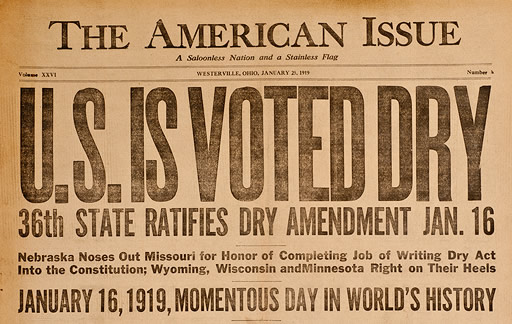I strongly believe that those of us that don’t learn from history are doomed to repeat it. That goes for ourselves and our nation. The only amendment to the Constitution of the United States that diminished our freedom was the 18th Amendment. It took almost 100 years to fan the flames of temperance into the fire of alcohol prohibition in our country. The road to Prohibition, it seems, may have been paved with good intentions, but a very vocal few, ultimately, determined the fate of America in the early twentieth century.
Many things factored into our country adopting Prohibition as the law of the land. Right up until the Industrial Revolution in the late 19th century, drinking water was still not widely available. Digging deep, freshwater wells would need the help of industrial equipment. Since the very first settlers arrived in America, beer, wine and spirits were the only potable beverage that you could trust. In booze we trust, as it were… People went from drinking about 2 gallons per capita per year in the early 1700s to nearly 7 gallons per person by 1830. It was only a matter of time before the drinking caught up with the country. Women were at the forefront of the campaign against drinking. It was considered “a man’s vice” and women formed groups to support their cause for moderate drinking. Without the vote, though, there was little they could do.
Temperance societies like the New York State Temperance Society, the Washingtonians (a precursor to AA), and the Sons of Temperance were formed before 1850. In 1874, the famous Women’s Christian Temperance Union (WCTU) was formed. Women, like Susan B. Anthony and Frances Willard, led women’s suffrage campaigns after finding that mens groups like the Anti-Saloon League were having more success campaigning the government. Men were the ones with political connections, and the frustration of women in not being heard led to the suffrage movement. In 1899, the famous Carrie Nation began her religiously inspired hatchet smashing of saloons and other drinking establishments. The country was rallying against liquor! Beer and wine weren’t originally on the chopping block at first. Once the idea of complete abstinence and the fervor to control the people’s drinking habits took hold, the country lost its head. A snowball effect began to take place.
The country was very angry after the Civil War in the 1860s and racism was rampant. Immigrants were not welcome and the generations of established American families saw the Irish and Germans with their drinking cultures as a threat to their American values. The Anti-Saloon League had close government ties and issued racially charged propaganda to citizens in publications. Upper class saloons weren’t attacked as much as those frequented by the working class (“barrel houses”) because the wealthy were considered more responsible drinkers (absolute nonsense).
The First World War was a huge contributor to the idea of Prohibition. Though beer wasn’t initially included on the list of drinks that had to go, the Germans were now the enemy and so were Misters Pabst, Schlitz, Miller and Busch. Xenophobia was getting the best of the American citizen and the drinks associated with those cultures had to go. Food shortages during the war would create the feeling that using grain to create alcohol was un-American. The more industrially focused the country became, the more drinking at work affected businesses economically and that would not stand. Alcoholism was affecting companies bottom lines!
Let’s not forget the influence of religion on the Great Experiment! Our nation, through both the 1st and the 14th amendments to the Constitution, gives our citizens the right to practice their own religion. We tend to forget that freedom of religion can mean any religion, not exclusively Christianity. It was a Christian driven agenda that drove much of the temperance movement. Defining what makes a good Christian is not the job of the government or politicians. In fact, many people became ordained ministers and rabbis during Prohibition to skirt the law through a religious use loophole.
One of the main reasons why all the complaining about excessive alcohol use throughout the country wouldn’t sway the U.S. government into declaring alcohol illegal is because at the start of the 20th century, 1/3 to one half of the government’s income was made through the taxation of alcohol. Taxes were raised to spite the liquor industry and increase the government’s income right up until Prohibition. However, in 1913, the income tax was created and the 16th amendment was added to the Constitution. This was a crushing blow, as it would enable Prohibition to now take place without bankrupting the country in the process. (Or so they thought…) There was no way to know that losing the tax income from alcohol and the cost to enforce Prohibition would be so…well, prohibitive. State legislatures began in the early 1900’s to declare their states dry without the public vote. (Those states were Alabama, Arkansas, Georgia, Idaho, Iowa, New Hampshire, Mississippi, Tennessee, Texas and Utah.) There was no stopping it now.
Learning that the people can be swayed to limit their own freedoms by propaganda and the desire to jump on political bandwagons is an important lesson. Considering the consequences that come with limiting the freedoms of this country’s citizenry is incredibly important. Could we have anticipated the exponential increase in crime, widespread job losses in the tens of thousands in everything from barrel making (cooperage) to paper manufacturing and packaging to farming, loss of grain production and agriculture, and the loss of $500 million a year in taxes? Could we have foreseen the economic hardships that would come from political corruption and the eventual collapse of our banking structure during the Great Depression immediately after Prohibition came to an end? Perhaps. The fact is that the lessons are there. We’ve experienced them as a nation before. Let’s attempt to learn from them and not to make them again.

